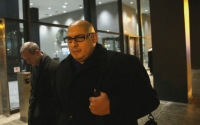Why the hacktivist network Anonymous is taking on rape
The hacktivist collective Anonymous has been making headlines this week after launching a campaign to support two teenage girls, Daisy Coleman and Paige Parkhurst, who say they were the victims of a pair of sexual assaults in Maryville, Mo., last year. But this is not the first time Anonymous has championed alleged rape victims when the group believes justice has not been served.
On August 11th, 2012, a video was uploaded to YouTube showing a former Steubenville High School student laughing uncontrollably about what sounded like the rape of an incapacitated girl. The former student, talking about pictures he had seen, can be heard on camera making light of the situation. “They raped her harder than that cop raped Marselis Wallace in Pulp Fiction… Oh my god. She is so raped right now. A dead body.”
Additional evidence of an assault appeared later on social media sites. A picture of a passed out girl being carried by two members of the town’s star football team showed up on Instagram. Comments like “Some people deserve to be peed on,” and “Never seen anything this sloppy… LOL.” appeared on Twitter.
The video, picture and tweets were soon removed, and the assault may never have come to the attention of the public had it not been for a crime blogger Alexandria Goddard, a former Steubenville resident. Two players were arrested a week later, but when the names of the boys were not made publically available, as was practice under Ohio law, Goddard started to blog about the case, questioning whether the boys were being given preferential treatment because they played on the town’s legendary football team.
Not long after, her blog, and the assault, came to the attention of Anonymous, a loosely organized group of internet activists, some would say vigilantes, who sometimes use their computer skills to right what they see are the wrongs of the world. When nearly five months had passed and they felt the prosecution was dragging its feet, they acted. They hacked into the Roll Red Roll website, a fan site for Steubenville’s high school football team, where they posted a video threatening to identify those responsible, unless they publicly apologized to the victim.
In typical Anonymous fashion, a person in a Guy Fawkes mask, speaking in an automated voice, described the incident saying, “The girl was sexually assaulted, molested, raped, and drug unconscious from party to party. ” The video warned: “You can hide no longer… you have attracted the attention of the hive… Expect us.”
The man behind the mask in this video is Deric Lostutter, an IT consultant in Richmond Kentucky. He talked to Al Jazeera America correspondent Lori Jane Gliha about his role in the Anonymous operation. Lostutter admitted to making the video, though he said someone else posted it to the Roll Red Roll fan website. Exposing the attack, he said, was not difficult.
“Their stupidity astounds me. They hung themselves. They posted themselves. They put all this out there, and we have the reputation of hackers, but nobody had to hack anything to get any of these tweets or anything like that,” he said.
Lostutter, who said he first became involved in Anonymous because of the group’s involvement in working to topple regimes in Tunisia and Egypt, felt obligated to act. “The Tweets and the Facebook posts that the kids made mocking the victim that the rapist themselves made -- it enraged me that someone could treat someone like that.”
When no-one came forward to apologize, Lostutter re-released the YouTube video of a student laughing about the assault. It became an internet sensation, racking up over a million views. CNN and other outlets picked it up, making Steubenville the focus of a massive media storm. Lostutter credits the video, which he said was sent to him through Twitter by someone from Steubenville, for sparking that attention. “That was the big bombshell that really got everybody going. It definitely made the splash needed to get more people involved in the investigation.” It also got people out into the streets, as protesters wearing the Anonymous Guy Fawkes masks converged on Steubenville.
In March of this year, the two football players involved in the attack, Malick Richmond and Trent Mays, were found guilty of raping the sixteen-year old -- a charge that under Ohio law includes digital penetration -- and sentenced to a minimum of one and two years in juvenile detention respectively.
For Lostutter, it was a powerful experience of making a difference. “We got 2,000 people on their city street peacefully, who stood there with signs. And rape victims coming forward for the first time speaking. It was very powerful.” He was humbled, he said, and empowered. “This is what the people are supposed to be like in America,” he told America Tonight.
The operation in Steubenville represents a new form of activism, organized almost entirely over the internet by tech-savvy individuals who use their computer skills to become involved in issues of social justice. Actions like those in Steubenville have no real leader; those who want to participate simply converge, like a flash mob, around a perceived injustice.
“You act and that's how you gain social capital,” said Quinn Norton, a journalist who covers hacker culture. “You don't have a resume, there's just a list of things you did.” She added that this loosely organized meritocracy is attractive to those who might not otherwise get involved in social issues.
During the Arab Spring, online activists took down Tunisian government websites and helped Egyptians evade government censorship. It changed them as much as those they helped. “Once you feel like you're a part of the Tunisian Revolution, you care about the world from your spare room in Ohio,” said Norton. “You care about the world in a way that very little, very little other things in society will train you to care about the world.”
If there is one thing that unites this diverse group of online activists, it is a dedication to the idea of the free and open exchange of information. It is this ideal, more than anything else, that has set these Hacktivists on a collision course with the established political order.
In the final part of our report, airing this evening, we look at the government crackdown against online activists, like Deric Lostutter. Does their pursuit of online protest go too far?












Error
Sorry, your comment was not saved due to a technical problem. Please try again later or using a different browser.